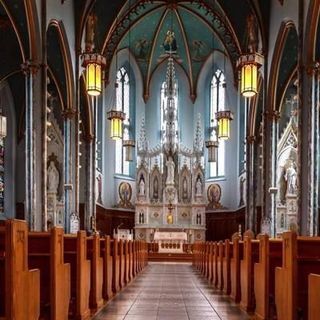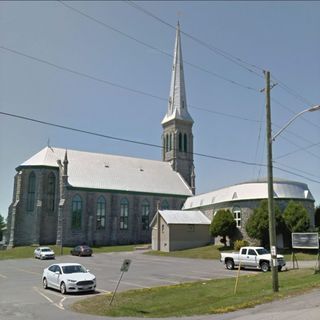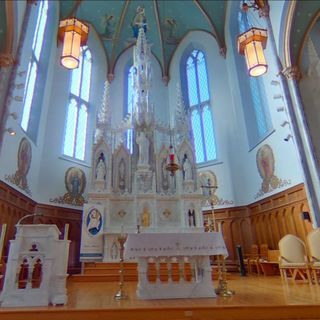We found 37 more Roman Catholic churches near St Andrews West
 Saint William, Martintown (2.61 miles)
Saint William, Martintown (2.61 miles) Blessed Sacrament Catholic Church, Cornwall (4.2 miles)
Blessed Sacrament Catholic Church, Cornwall (4.2 miles) Blessed Sacrament, Cornwall (4.22 miles)
Blessed Sacrament, Cornwall (4.22 miles)
 Sainte Therese de Lisieux, Cornwall (5.05 miles)
Sainte Therese de Lisieux, Cornwall (5.05 miles) Church of St. William, Martintown (5.67 miles)
Church of St. William, Martintown (5.67 miles) St. Columban's Parish, Cornwall (6.09 miles)
St. Columban's Parish, Cornwall (6.09 miles) Saint Columban, Cornwall (6.1 miles)
Saint Columban, Cornwall (6.1 miles) Saint Francis de Sales, Cornwall (6.23 miles)
Saint Francis de Sales, Cornwall (6.23 miles) Saint, Cornwall (6.48 miles)
Saint, Cornwall (6.48 miles) St Felix De Valois Church, Cornwall (6.48 miles)
St Felix De Valois Church, Cornwall (6.48 miles) Cocathedrale de la Nativite de la B.V.M., Cornwall (6.76 miles)
Cocathedrale de la Nativite de la B.V.M., Cornwall (6.76 miles) Church of St. Peter, Cornwall (6.83 miles)
Church of St. Peter, Cornwall (6.83 miles) St. Peter's Parish, Cornwall (6.84 miles)
St. Peter's Parish, Cornwall (6.84 miles) Saint Peter, Cornwall (6.91 miles)
Saint Peter, Cornwall (6.91 miles) Sainte Croix, Cornwall (7.11 miles)
Sainte Croix, Cornwall (7.11 miles) Saint Michael's Chapel, Monkland (7.89 miles)
Saint Michael's Chapel, Monkland (7.89 miles) Church of St. Michael, Monkland (7.89 miles)
Church of St. Michael, Monkland (7.89 miles) Saint Michael's Chapel, Monkland (7.92 miles)
Saint Michael's Chapel, Monkland (7.92 miles) Saint Anthony's Parish, Apple Hill (8.68 miles)
Saint Anthony's Parish, Apple Hill (8.68 miles) Precious Blood, Cornwall (8.94 miles)
Precious Blood, Cornwall (8.94 miles) Precious Blood/Precieux Sang, Cornwall (9.09 miles)
Precious Blood/Precieux Sang, Cornwall (9.09 miles) Holy Name of Jesus Academy, Massena (9.6 miles)
Holy Name of Jesus Academy, Massena (9.6 miles) Mission Iroquoise de Saint-Regis, Akwesasne Mohawk Nation (9.72 miles)
Mission Iroquoise de Saint-Regis, Akwesasne Mohawk Nation (9.72 miles) Saint Mary's, Williamstown (11.05 miles)
Saint Mary's, Williamstown (11.05 miles) Church of St. Mary, Williamstown (11.05 miles)
Church of St. Mary, Williamstown (11.05 miles) Saint Mary, Williamstown (11.11 miles)
Saint Mary, Williamstown (11.11 miles) Our Lady of Grace, Ingleside (11.59 miles)
Our Lady of Grace, Ingleside (11.59 miles) Saint Raphael, Saint Raphael (12.61 miles)
Saint Raphael, Saint Raphael (12.61 miles) Church of St. James, Maxville (13.5 miles)
Church of St. James, Maxville (13.5 miles) Saint James RC Church, Maxville (13.61 miles)
Saint James RC Church, Maxville (13.61 miles) Saint Catherine of Sienna, Greenfield (13.87 miles)
Saint Catherine of Sienna, Greenfield (13.87 miles) Our Lady of the Angels/Notre, Moose Creek (14.18 miles)
Our Lady of the Angels/Notre, Moose Creek (14.18 miles) St. Bernard's Roman Catholic Church, Finch (14.29 miles)
St. Bernard's Roman Catholic Church, Finch (14.29 miles) Saint Bernard, Finch (14.31 miles)
Saint Bernard, Finch (14.31 miles) St. Joseph's Parish, Lancaster (14.68 miles)
St. Joseph's Parish, Lancaster (14.68 miles) Saint Joseph, Lancaster (14.71 miles)
Saint Joseph, Lancaster (14.71 miles) Sainte, Green Valley (14.85 miles)
Sainte, Green Valley (14.85 miles)
- Roman Catholic churches in St Andrews West, ON
- Roman Catholic churches in Ontario
- Roman Catholic churches in Canada
- Roman Catholic churches near me
- All churches in St Andrews West, ON
Who we are
St Andrew Catholic Church in St Andrews West, Ontario is a Christian congregation serving the St Andrews West community and seeking, engaging, and encouraging others through a life-changing Christian journey.
We seek to be a loving, friendly community that worships God, and serves others. We place a high priority on teaching from the Bible and following the example of Jesus.
Our vision is to impact and renew St Andrews West and beyond with the transforming message of Jesus Christ through words and actions.
Come as you are - we'd love to get to know you.
We seek to be a loving, friendly community that worships God, and serves others. We place a high priority on teaching from the Bible and following the example of Jesus.
Our vision is to impact and renew St Andrews West and beyond with the transforming message of Jesus Christ through words and actions.
Come as you are - we'd love to get to know you.
Street Address
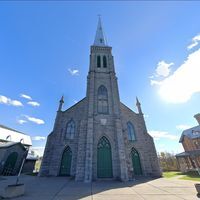
17298 County Road 18
St Andrews West,
ON
K0C 2A0
Canada
Phone: 613-932-9226
Fax: 613-933-3266
Download St Andrew Catholic Church vCard with Mass Times
Click here to contact the church
Church Pastor
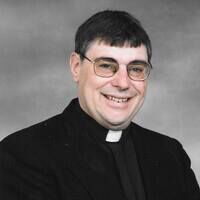
Pastor
17298 County Road 18
St Andrews West,
ON
K0C 2A0
Canada
Phone: 613-932-9226
Fax: 613-933-3266
Download Pastor Rev. Louis Groetelaars vCard
Click here to contact Rev. Louis Groetelaars
Denomination
Roman Catholic
Affiliations
rchdiocese of Ottawa-Cornwall
Church Website
St Andrew Catholic Church on Social Media
Facebook Video: 6th Sunday of Ordinary time Mass, Feburary 11, 2023 at St Andrew's Church
Leadership
Leader Name:
Rev. Louis Groetelaars
Leader Position:
Pastor
Formal Title:
Leader Address:
Phone:
Fax:
613-933-3266
Leader Email:
Click here to contact Rev. Louis Groetelaars
Leader Bio:
Rev. Louis Groetelaars on Social Media:
Other Church Leaders:
Leadership Photos
Administration
Admin Name:
Sister Terry Ann Wilson
Admin Position:
Pastoral Minister
Admin Address:
Phone:
Fax:
613-933-3266
Admin Email:
Click here to contact Sister Terry Ann Wilson
Mailing Address
P. O. Box 30
St. Andrews West, Ontario
K0C 2A0
St. Andrews West, Ontario
K0C 2A0
Driving Directions
Travel/Direction Tips
Know how to get there? Share the knowledge with others!
Parking
Please share parking information and/or parking experience!
St Andrew Catholic Church Mass Times
Mass
Saturday: 5:00 PM
Sunday: 9:00 AM 10:30 AM
St Andrew Catholic Church mass times last updated on the 29th of November, 2024
Saturday: 5:00 PM
Sunday: 9:00 AM 10:30 AM
St Andrew Catholic Church mass times last updated on the 29th of November, 2024
Worship Languages
Dress Code
Sunday School / Children and Youth Activities
Under 12s:
Under 18s:
Local outreach & community activities
Other activities & ministries
Special Needs/Accessibility
Prayers and Hymns
Main Bible:
Hymns and Songs:
Other information
Average Adult Congregation:
Average Youth Congregation:
Additional Info:
St Andrew Catholic Church St Andrews West Photos
St Andrew Catholic Church History
St. Andrew's Parish, St. Andrew's West - 1802
St. Andrew's is one of Ontario's most historical centres and along with St. Raphael's, is the cradle of Catholicism. Both parishes were canonically established in the same letter from Bishop Plessis of Quebec in 1802.
In the years preceding 1783, the United Empire Loyalists were facing hardships in their new land, America. Because of religious differences and rebellions which heralded the American revolution, they had to leave and migrate to British Canada in order to remain loyal to God and their motherland.
Some time between 1780-83, a small group of about 38 families under the leadership of a Father McKenna from Scotland followed the Saranac-Malone trail to St. Regis. These hardy pioneers were assisted by Indians who guided them across the St. Lawrence to this lovely spot on the banks of the Raisin River, north of the new settlement of New Johnstown (new Cornwall). They arrived on the vigil of St. Andrew, hence the name of our parish. The first regular pastor for St. Andrew's was probably Rev. Roderick Macdonell who was at St. Regis in 1785. An old document, written by Rev. Roderick Macdonell states he "…by permission of His Majesty came to this province in the year 1785 to serve a considerable Body of Loyal Roman Catholic Subjects from North Britain…" He came, apparently, not as a missionary to th Indians, but to the Scottish settlers in Stormont and probably Glengarry. He likely was appointed to St. Regis after his arrival in Canada while still diligently caring for the spiritual welfare of the Scottish settlers. It is safe to assume that services were held at St. Andrew's from 1785 onwards.
First Church
The first church was constructed in 1785, soon after Fr. Roderick Macdonell's arrival. It was built on the south bank of the Raisin River about the centre of the existing cemetery. Constructed of rough logs, it measured approximately 20' X 24'. In this church, Fr. Roderick administered baptism to 20 children and performed several marriages between 1784 and 1895. He died in 1806 and is buried at St. Regis. The wooden church being pronounced unsuitable by the Bishop of Quebec, a new church was begun for St. Andrew's about 1792.
Old Stone Church
In April, 1796, Patt and Donald McGuire sold two acres to the Rev. Roderick Macdonell. After some legal transfer difficulties were solved the church was begun, probably 1798 - 1800. It was constructed of fieldstone, 38' wide and 76' long, with walls three feet thick. It was erected 100 feet south of the original log church. An elaborate altar carved by Philip Liebert of Montreal was placed in the sanctuary. Commissioned by 'Spanish John MacDonell', it is still referred to as 'Spanish Altar'.
The old stone church was completed in 1801 at a cost of 700 pounds or $2,800.00. Fur traders of the North West Company helped financially and the building, now used as a parish hall, is still standing, solid as ever.
The New Church
On Sunday, March 22, 1857, Rev. George Hay, pastor of St. Andrew's, called a meeting after mass. He asked the parishioners to consider the construction of a larger church, due to the growth of the parish. The parishioners agreed. The digging of the foundation of the new church was begun on may 17, 1857. Work progressed until the building committee ran out of money. Delay was not for very long. The church was completed in 1860, except for the spire.
The new church dwarfed the old even without its spire. It measured 115' x 55' x 34' high, to the top of the stone walls. The church was heated with four wood stoves. On each side wall are five large gothic windows, one on the east side, being of beautiful stained glass. The bell tower and steeple, constructed at the north entrance sometime between 1879-90, soars to a height of 212' from ground level to the top of the 18' high cross.
First Cemetery
The first cemetery dates from the beginning of the parish. Graves are marked by monuments worn by nature through the years. A large granite monument marks the grave of Johnm Sandfield MacDonald, first premier of Upper Canada, and his wife Christine Wagman, who is burined beside him. The grave of Simon Fraser, explorer of British Columbia's magnificent Fraser River and Valley, is marked by a grey tombstone. He died August 18, 1862, and his wife Catherine MacDonald, who died on August 19, 1862, lies buried beside him. In 1938, this cemetery was designated an Historical Site. Extensive refurbishing of the site was carried out including a stone fence enclosure.
Parish Priests 1785 - 1990
1785 - 1806, Fr. Roderick Macdonell; 1807, Fr. Francis Fitzsimmons; 1808-1818, no parish priest; 1807-1815, Rt. Rev. Alexander Macdonell, later first Bishop of Upper Canada, who was at St. Raphael's, signed birth, death, and marriage certificates. Fr. Gaulin, John MacDonald and Sister Pelogia c.n.d., Fr. Aeneas MacDonald and Fr. Edward Gordon also signed.
1821-1827, Fr. John O'Meara; 1829-1836, Fr. William Fraser; 1836-1876, Fr. George Hay; 1876-1879, Fr. Fox; 1879-1890, Fr. George Corbet; 1890-1906, Fr. William Macdonell, later 2nd Bishop of Alexandria; 1903, Fr. Terrence Patrick Fitzpatrick; 1906-1908, Fr. D.C. McRae; 1908-1922, Fr. John E. McRae, later Superior of Scarboros Foreign Missions; 1922-1956, Msgr. Albert A McRae; 1956-1971, Msgr. James A. Wylie; 1971-1988, Fr. John R. Donihee; 1988, Fr. Charles F. MacDonald. Father William Fraser and Father George Hay are buried in a crypt under the church. A tablet to their memory hangs on the east wall near the Blessed Virgin's altar.
Religious Orders of Sisters
Over the years, St. Andrew's Parish has been served by three different orders of sisters. Father Hay and his parishioners had the first convent constructed in 1848. The Grey Nuns of Ottawa operated the school for three year before being recalled by their Mothehouse. The convent became empty and remained so for 32 years. Looking out from the rectory to a Convent hidden by long weeds and brushes, Fr. Hay was heard to remark, …"those empty walls have whitened my head, they weigh heavily on my heart."
In 1833, at the urgent request of the pastor, Fr. George Corbet, the Sisters of the Congregation of Notre-Dame of Montreal came to live and take charge of the Convent. Hardship, lack of water, and of household equipment tested the missionary calibre of the nuns. The people of St. Andrew's, however, never let the Sisters forget how much they were wanted. Their charity, donations and provisions made it possible for the Sisters to subsist through their first trying years.
Between 1905-08, during Fr. D.C. McRae's pastorate, a new Convent was built. This fine structure still stands and is known as the heritage Centre. In 1918, because of difficulty in providing qualified teachers to meet growing requirements, the general council withdrew the Sisters after 35 years of service.
The new pastor, Rev. John E. MrRae, immediately set out in search of another order of Sisters. He was successful in persuading the Sisters of St. Joseph of Peterborough to take over from where the C.N.D. sisters had left off. The St. Joseph Sisters had a hard act to follow. Much credit must be given to these initial six Sisters of St. Joseph. They fulfilled their duties admirably and soon gained a special place in the hearts of the good people of St. Andrew's. Classes were taught from first grade to grade 13 High school. After 58 years of living and serving the people of St. Andrew's, the Sisters, in 1976, were called back to their Mother house. The school at present, Grades 1 - 8, is staffed entirely by lay people. The quality of education then as now, remains excellent.
St. Andrew's is one of Ontario's most historical centres and along with St. Raphael's, is the cradle of Catholicism. Both parishes were canonically established in the same letter from Bishop Plessis of Quebec in 1802.
In the years preceding 1783, the United Empire Loyalists were facing hardships in their new land, America. Because of religious differences and rebellions which heralded the American revolution, they had to leave and migrate to British Canada in order to remain loyal to God and their motherland.
Some time between 1780-83, a small group of about 38 families under the leadership of a Father McKenna from Scotland followed the Saranac-Malone trail to St. Regis. These hardy pioneers were assisted by Indians who guided them across the St. Lawrence to this lovely spot on the banks of the Raisin River, north of the new settlement of New Johnstown (new Cornwall). They arrived on the vigil of St. Andrew, hence the name of our parish. The first regular pastor for St. Andrew's was probably Rev. Roderick Macdonell who was at St. Regis in 1785. An old document, written by Rev. Roderick Macdonell states he "…by permission of His Majesty came to this province in the year 1785 to serve a considerable Body of Loyal Roman Catholic Subjects from North Britain…" He came, apparently, not as a missionary to th Indians, but to the Scottish settlers in Stormont and probably Glengarry. He likely was appointed to St. Regis after his arrival in Canada while still diligently caring for the spiritual welfare of the Scottish settlers. It is safe to assume that services were held at St. Andrew's from 1785 onwards.
The first church was constructed in 1785, soon after Fr. Roderick Macdonell's arrival. It was built on the south bank of the Raisin River about the centre of the existing cemetery. Constructed of rough logs, it measured approximately 20' X 24'. In this church, Fr. Roderick administered baptism to 20 children and performed several marriages between 1784 and 1895. He died in 1806 and is buried at St. Regis. The wooden church being pronounced unsuitable by the Bishop of Quebec, a new church was begun for St. Andrew's about 1792.
Old Stone Church
In April, 1796, Patt and Donald McGuire sold two acres to the Rev. Roderick Macdonell. After some legal transfer difficulties were solved the church was begun, probably 1798 - 1800. It was constructed of fieldstone, 38' wide and 76' long, with walls three feet thick. It was erected 100 feet south of the original log church. An elaborate altar carved by Philip Liebert of Montreal was placed in the sanctuary. Commissioned by 'Spanish John MacDonell', it is still referred to as 'Spanish Altar'.
The old stone church was completed in 1801 at a cost of 700 pounds or $2,800.00. Fur traders of the North West Company helped financially and the building, now used as a parish hall, is still standing, solid as ever.
On Sunday, March 22, 1857, Rev. George Hay, pastor of St. Andrew's, called a meeting after mass. He asked the parishioners to consider the construction of a larger church, due to the growth of the parish. The parishioners agreed. The digging of the foundation of the new church was begun on may 17, 1857. Work progressed until the building committee ran out of money. Delay was not for very long. The church was completed in 1860, except for the spire.
The new church dwarfed the old even without its spire. It measured 115' x 55' x 34' high, to the top of the stone walls. The church was heated with four wood stoves. On each side wall are five large gothic windows, one on the east side, being of beautiful stained glass. The bell tower and steeple, constructed at the north entrance sometime between 1879-90, soars to a height of 212' from ground level to the top of the 18' high cross.
First Cemetery
The first cemetery dates from the beginning of the parish. Graves are marked by monuments worn by nature through the years. A large granite monument marks the grave of Johnm Sandfield MacDonald, first premier of Upper Canada, and his wife Christine Wagman, who is burined beside him. The grave of Simon Fraser, explorer of British Columbia's magnificent Fraser River and Valley, is marked by a grey tombstone. He died August 18, 1862, and his wife Catherine MacDonald, who died on August 19, 1862, lies buried beside him. In 1938, this cemetery was designated an Historical Site. Extensive refurbishing of the site was carried out including a stone fence enclosure.
1785 - 1806, Fr. Roderick Macdonell; 1807, Fr. Francis Fitzsimmons; 1808-1818, no parish priest; 1807-1815, Rt. Rev. Alexander Macdonell, later first Bishop of Upper Canada, who was at St. Raphael's, signed birth, death, and marriage certificates. Fr. Gaulin, John MacDonald and Sister Pelogia c.n.d., Fr. Aeneas MacDonald and Fr. Edward Gordon also signed.
1821-1827, Fr. John O'Meara; 1829-1836, Fr. William Fraser; 1836-1876, Fr. George Hay; 1876-1879, Fr. Fox; 1879-1890, Fr. George Corbet; 1890-1906, Fr. William Macdonell, later 2nd Bishop of Alexandria; 1903, Fr. Terrence Patrick Fitzpatrick; 1906-1908, Fr. D.C. McRae; 1908-1922, Fr. John E. McRae, later Superior of Scarboros Foreign Missions; 1922-1956, Msgr. Albert A McRae; 1956-1971, Msgr. James A. Wylie; 1971-1988, Fr. John R. Donihee; 1988, Fr. Charles F. MacDonald. Father William Fraser and Father George Hay are buried in a crypt under the church. A tablet to their memory hangs on the east wall near the Blessed Virgin's altar.
Religious Orders of Sisters
Over the years, St. Andrew's Parish has been served by three different orders of sisters. Father Hay and his parishioners had the first convent constructed in 1848. The Grey Nuns of Ottawa operated the school for three year before being recalled by their Mothehouse. The convent became empty and remained so for 32 years. Looking out from the rectory to a Convent hidden by long weeds and brushes, Fr. Hay was heard to remark, …"those empty walls have whitened my head, they weigh heavily on my heart."
Between 1905-08, during Fr. D.C. McRae's pastorate, a new Convent was built. This fine structure still stands and is known as the heritage Centre. In 1918, because of difficulty in providing qualified teachers to meet growing requirements, the general council withdrew the Sisters after 35 years of service.
The new pastor, Rev. John E. MrRae, immediately set out in search of another order of Sisters. He was successful in persuading the Sisters of St. Joseph of Peterborough to take over from where the C.N.D. sisters had left off. The St. Joseph Sisters had a hard act to follow. Much credit must be given to these initial six Sisters of St. Joseph. They fulfilled their duties admirably and soon gained a special place in the hearts of the good people of St. Andrew's. Classes were taught from first grade to grade 13 High school. After 58 years of living and serving the people of St. Andrew's, the Sisters, in 1976, were called back to their Mother house. The school at present, Grades 1 - 8, is staffed entirely by lay people. The quality of education then as now, remains excellent.
St Andrew Catholic Church Historical Photos
Add a historical photo
St Andrew Catholic Church listing was last updated on the 29th of November, 2024


